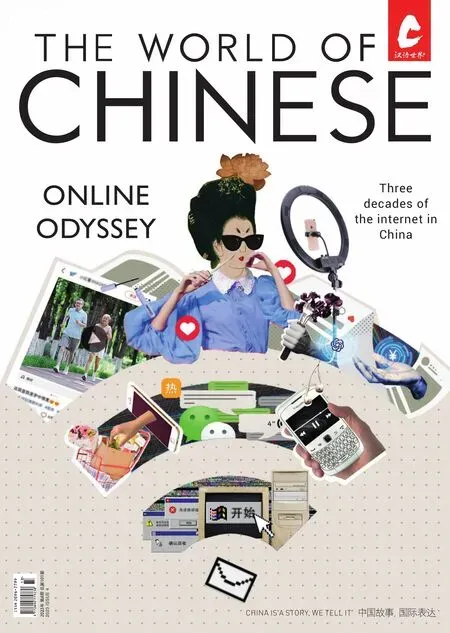Defending the Field
2023-12-16ByZhengYiwen郑怡雯
By Zheng Yiwen (郑怡雯)
Cover image by Soth
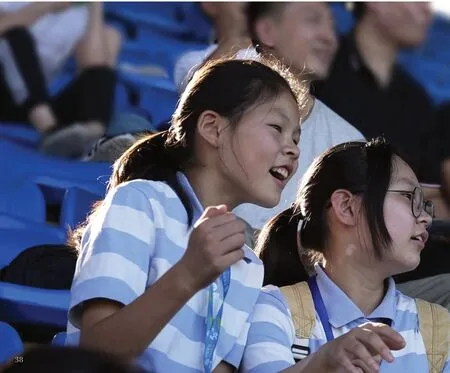
Faced with harassment in stadiums and online, female sports fans struggle to create safe spaces for their hobby
球场上“她”的声音:女球迷的呐喊
Though staffmembers were holding up signs urging fans to be “civilized,”the atmosphere in the stadium was anything but.On August 9, the highly anticipated Jing-Jin derby match between the Tianjin Jinmen Tiger and Beijing Guoan soccer teams was held again in the Tianjin TEDA Soccer Stadium after 13 long years, and throughout the game, spectators from both sides relentlessly chanted “shabi”—a Chinese curse word referring to a part of the female anatomy.

Lost amid a sea of male spectators roaring slurs and flipping their middle fingers at their rivals were the handful of female fans in the stands.In a packed stadium of 28,550 attendees,women appeared to make up around 10 percent of the total crowd.Perhaps accustomed to the vulgarities, they appeared like silent outsiders in the testosterone-fueled stands.
After the game, two female spectators, who identify themselves by their surnames Cai and Yuan, share their experience with TWOC.They have come, not out of their own love for the sport, but to accompany their husbands,both avid fans.
“There’s a stereotype that because girls are discouraged from playing soccer from a young age, they don’t understand the sport, and they won’t follow it.”
“I don’t usually watch soccer.My husband supports the Tianjin team.I just came to keep him company and maybe soak up the match atmosphere,” says Cai, somewhat shyly.
Most female attendees at the match appeared to be accompanying their male partners or their children.Some, without any keen interest in the game, were seen scrolling on their phones as the match played on.
In recent decades, major sports like soccer and basketball have amassed huge followings in China.But the fandom is overwhelmingly male.A study titled “Chinese Soccer Fan Behavior,”jointly published in 2022 by the sports news and soccer community app Dongqiudi and consulting group iResearch, reveals that out of the 200 million soccer enthusiasts in China, a staggering 87.3 percent are boys and men.
Basketball, another billion-yuan sports industry in China, doesn’t fare any better in terms of gender balance.In 2021, the Chinese Basketball Association’s (CBA) “Report on the Development of Basketball Sports in China”stated that approximately 125 million people play basketball in the country.But a recent“Tencent NBA 2022-23 Season Fan Study”shows men make up 83 percent of fans of the National Basketball Association (NBA), the US’s top professional basketball league, in China.
No room for female fans
Although modern soccer is played and enjoyed by men and women around the world, the sport and its associated culture remain far from an even playing field.Discrimination is rooted in the history of the “beautiful game.”
The first Men’s World Cup kicked offin 1930, but many European soccer associations imposed bans on women’s soccer until the late 1970s.The world had to wait until 1991 for the first official Women’s World Cup to be held (in China).Even the right of women to watch the game has been curbed in certain conservative corners of the world: It was only in 2022 that Iran allowed female spectators to watch domestic league matches in stadiums.
Similarly, audiences’ and sponsors’ interest in women’s sports, like China’s Women’s Super League (the top professional soccer league in the country), is negligible when compared with sports played by men.On August 13, the Beijing Women’s soccer team faced offagainst the Shaanxi Zhidan team in Beijing’s old, decaying,and near-empty Xiannongtan Stadium.Unlike the hard-to-find tickets for the men’s Super League, which are often sold out or scalped at high prices immediately after they are released,admission to women’s matches is free.But out of a stadium that could accommodate 30,000, just over 1,000 attendees turned up, with perhaps 70 percent of them being men.
“There’s a stereotype that because girls are discouraged from playing soccer from a young age, they don’t understand the sport, and they won’t follow it,” Abby Fu, a sports journalist and the founder of a WeChat public account dedicated to women’s sports, tells TWOC.“This is one reason there are fewer female fans than male ones.”
The dominance of a male perspective in sports coverage is also a barricade against female fans.“Soccer is often called the ‘war of peacetime.’Teams on the pitch are like armies on a battlefield.Starting lineups are akin to deployingtroops in war,” Xu Ye, a professor at Guizhou University’s School of Media, tells TWOC.“The militaristic discourse in sports journalism crafts a predominantly masculine narrative,focusing on strategies and data, alienating potential female fans.”
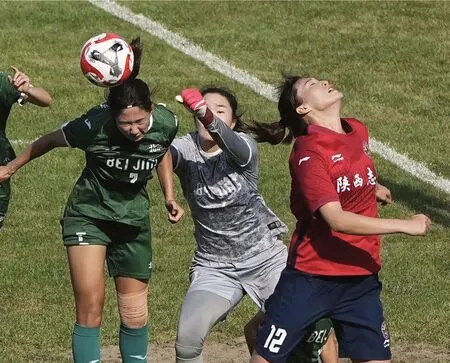
Women’s soccer participation has stagnated in China over the last two decades (Soth)
The gender disparity isn’t just a matter of numbers but influences male fans’ behavior and their treatment of women who watch sports,both online and offline.The sports community’s overarching masculinity is manifest in various forms of exclusion and harassment, impacting female fans’ enjoyment of sport.
In July this year, a video surfaced on Douyin(China’s version of TikTok) showing a female spectator, who wore a replica jersey of the men’s Chinese Super League team Shanghai Port F.C.,sat quietly in the stadium’s front rows.
But her presence triggered intense disapproval from male supporters of Beijing Guoan seated in higher stands.Verbal abuse, laden with expletives, was hurled at her.Security guards,in a move that was later questioned by netizens,approached not the harassers but the female fan and advised her to leave.As she left the stadium, she was met with triumphant jeers and laughter from the Guoan supporters, many of whom recorded short videos of this “memorable moment” to share online.
In March, during a CBA match between Beijing and Guangzhou, a female fan supporting the Beijing team was molested by a male Guangzhou supporter twice.She fought back, capturing video evidence against her perpetrator.The local police subsequently detained the man for five days.
Rewind to 2012: Outside the Shanghai Hongkou Soccer Stadium, a group of over 10 male fans of Shanghai Shenhua aggressively pursued and jostled a woman wearing a Beijing Guoan jersey.Some even yelled at her to “strip off[her] jersey.” Luckily, she escaped.
Online forums and misogyny
While offline incidents of male fans berating or harassing female fans may be brushed offas isolated events, fueled by team rivalries and rowdy individuals, the online world tells a different story.The cybersports arena in China pulsates with an even more aggressively masculine vibe than many physical sports venues.
Hupu.com, one of China’s most popular sports forums, is a well-known example.Founded in 2004, the platform boasted a user base exceeding 100 million as of 2020, with 80 million active users.Over 90 percent of these users are male.With its vast array of threads, opinions, and banter on sports, politics, and other subjects,Hupu stands as the barometer for views and trends among China’s sports watchers.
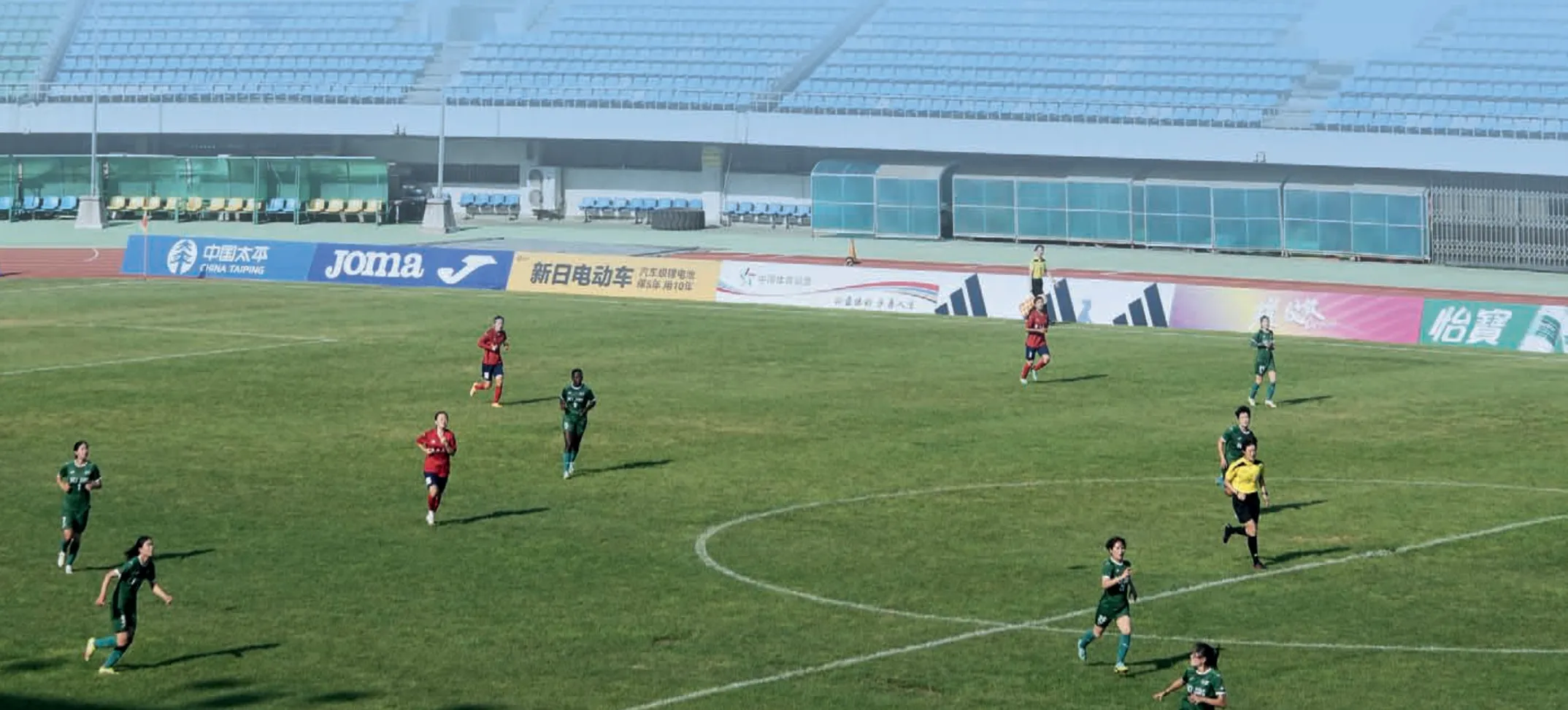
Women’s Super League matches in China are often poorly attended by fans.Like this one on August 13.(Soth)
However, it has also become notorious for being one of the most misogynistic quarters of the Chinese internet.Female fans brave enough to venture onto the site often find themselves under a barrage of gender-based attacks, with male users questioning their knowledge, commitment to sports, and even their right to participate in sports-related discussions.
Liang Baoyi, a 33-year-old avid Lionel Messi fan, fell in love with soccer in 2010 when her date took her to a match.She didn’t miss watching a single one of Messi’s matches in the 2018 – 2019 soccer season, regardless of time zone; and in 2022, she evaded stringent Chinese pandemic restrictions to travel to Qatar to watch the Men’s World Cup, witnessing the exhilarating moment when Argentina clinched the championship.
However, Liang’s experience as a soccer aficionado has not been smooth, especially on Hupu.“Every time I browse Hupu, I can’t help but feel frustrated by the comments that are more or less gender-biased,” she tells TWOC.“Those male fans incessantly pick on female enthusiasts like me.You’re either dismissed as someone trying to impress the boys, or put under a microscope to‘test’ your understanding of the game.”
“They seem to believe that, by virtue of being a woman, you can’t genuinely comprehend soccer,”says Liang.“It feels like a lose-lose situation.”Jacqueline Yi, another soccer enthusiast and long-time user of Hupu, feels the platform has changed significantly over the years.“I joined Hupu back in 2008 when it was still known as Hoop-China and primarily a basketball forum.The soccer discussion zone was titled‘GoalHi.’ Back then, the atmosphere of the entire community was genuinely good,” she reminisces.“There were many users with overseas backgrounds translating sports articles and commentaries from abroad; it was primarily about knowledge and information-sharing.”
Over time, however, Hupu became an increasingly hostile space for women.A wildly popular section of the website called “Hupu Pedestrian Street,” where users can chat about any subject, soon became a hub for men who fondly addressed each other as “JRs” (thepinyininitials forjiaren, meaning ‘family member,’something akin to ‘Bro’ in English).Since then, discussions on these bulletin boards have occasionally been covered by mainstream news reports, usually because they were involved in some gender-related controversy.
“You’re either dismissed as someone trying to impress the boys, or put under a microscope to‘test’ your understanding of the game.”
Starting in 2012, Hupu saw the rise of “Green Hat Literature,” a genre of social media posting where male users shared and discussed personal stories of their partners’ infidelity.The annual “Hupu Goddess Selection Contest,”considered a benchmark for Chinese “straight men aesthetics,” began in 2016.Here, female celebrities were pitted against each other in multiple rounds of user votes, similar to the format of the soccer World Cup, with the aim to crown a single “Hupu Goddess.”
“As the years went by and the user base grew,the overall atmosphere turned increasingly toxic,” Yi recalls.“I was repulsed by threads where men rated women.Roughly seven or eight years ago, I stopped visiting Hupu.”
Yi has long been passionate about sports.She started watching the World Cup and the NBA Finals in 2006, and her allegiances lie firmly with Argentina in soccer and the Dallas Mavericks in basketball.
Yet, similar to Liang, she often finds herself in situations where she feels compelled to defend her sports knowledge and her authenticity as a true fan.When discussing sports with men, “I constantly feel the need to prove myself because of my gender,” she says.
In one particularly memorable instance,she had an offline conversation with a male employee of Hupu.When she mentioned she had been using the platform since 2008, he was incredulous.“He refused to believe that I had been a user for that long, insisting on checking my account’s registration date for verification,”she recounts.Similar skepticism arises when she tells men that she started watching sports in 2006.“Their immediate reaction is one of disbelief.” During the 2022 World Cup, a man insisted that Yi name the members of the Argentine national team from 2006 to “prove”her genuine interest in the sport.
“Is it so implausible to think that when women watch a game, they might be interested in more than just the handsome players?”
Creating female-friendly sports communities
With misogyny and condescension rife in maledominated sports forums and stadiums, female fans like Liang and Yi are seeking alternative platforms to pursue their passion.
Liang is the leader of several small group chats on WeChat, consisting of a few female fans,creating a safe space where they can discuss various soccer topics without facing unwanted scrutiny or doubt.In one group, Liang and two other passionate soccer fans, who she met online in 2021 when they discussed Messi’s controversial exit from Barcelona F.C., shared thoughts about the Argentine player and engaged in broader discussions on other soccer leagues, travel, lifestyle, and news.The three finally met in real life at the Qatar 2022 World Cup last December.
Yi occasionally turns to the “Female Sports Observers” group on social media app Douban.Compared to other popular Douban groups on travel, cuisine, and lifestyle, which can have over 100,000 members, this group has around 12,600 members.Participation in discussions is reserved for women.Prospective members must apply and be approved by the administrator before they can join the conversation.
The group boasts a variety of topics covering various sports, from soccer and basketball to badminton, boxing, and skiing.Popular discussion threads touch upon intriguing moments in specific matches, NBA basketball player Stephen Curry’s stance on gender equality, the most attractive athletes, and personal experiences in sports,among other themes.
Recently, Yi has also begun exploring soccer topics on Xiaohongshu, a social media platform with a 70-percent female user base.She finds the atmosphere on this platform to be much more cordial and understanding for female soccer fans.However, due to the platform’s structure, interactions happen mainly under individual posts by users, and it lacks the community feel of group chats or online discussion threads.
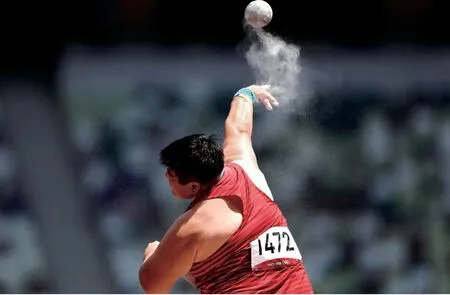
Gong Lijiao won the women’s shot put competition at the Tokyo Olympics in 2021, but the 34-year-old athlete still faced demeaning questions during interviews after her victory (VCG)
Sports journalist Fu is also taking action.During the Tokyo Olympics in 2021, China’s shot put champion Gong Lijiao faced a demeaning question from a female journalist from state broadcaster CCTV: “When will you become a girl again?” The incident infuriated Fu, who is passionate about creating a more inclusive space for women to enjoy sports.
Fu runs a WeChat group made up of over 200 female sports enthusiasts.After the Chinese team’s victory at the Women’s Basketball Asia Cup this July, many male fans expressed interest in joining the group.To maintain a safe environment, Fu is diligent about screening male applicants.“When men want to join, I ask them to introduce themselves in detail, particularly about their views on women participating in sports discussions,” Fu tells TWOC.“If any member posts inappropriate content targeting women, I won’t hesitate to remove them.”
The group also organizes offline events for its members.After an infamous assault on four women took place in the northern Chinese city of Tangshan in June 2022, Fu started offering selfdefense training sessions.Additionally, she rallies members to participate in sports activities like Frisbee and viewing parties for English Premier League matches.
“Women need communities like this, as our understanding of sports differs,” Fu says.According to her, it’s mostly men who set arbitrary standards and barriers for enjoying sports.“Does understanding soccer necessarily mean knowing all the tactics, formations, or mastering the rules?Is it so implausible to think that when women watch a game, they might be interested in more than just the handsome players?”
Xu, the professor, believes that sports can be a lens through which multiple societal facets can be scrutinized: nationalism, gender issues, and more.“The challenges faced by female soccer fans are merely a microcosm of the broader systemic inequalities women face in society.There’s a long way to go,” she says.
